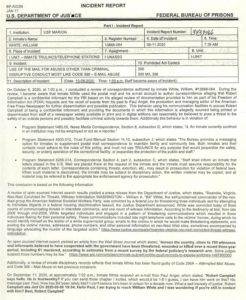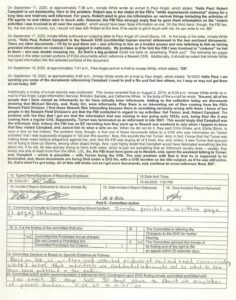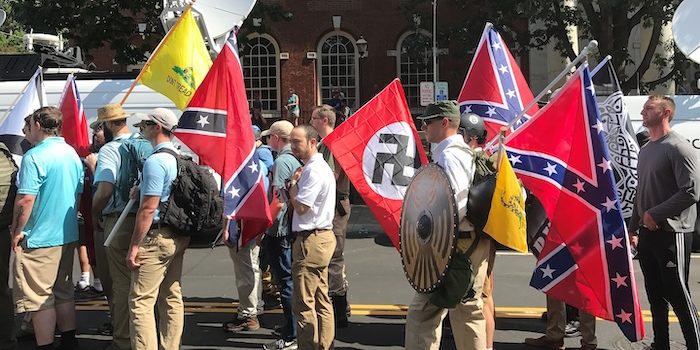(Ken Silva, Headline USA) Over the last several years, prison inmate Bill White has filed numerous lawsuits that identify alleged FBI informants in the neo-Nazi movement. These filings have underpinned a series of Headline USA articles dubbed the “Fed Files.”
White now faces potential court sanctions over his disclosures. In a Sept. 26 motion, Justice Department prosecutors argued that White is trying to circumvent prison mail restrictions by identifying informants in his court records.
The U.S. government certainly has good reasons to keep its network of spies confidential—corruption within the FBI’s informant system notwithstanding.
However, the DOJ’s own filings against White have also exposed the identities of alleged FBI informants, including ones that weren’t previously public. And ironically, the DOJ outed the alleged informants in the same case where White faces sanctions.
The DOJ’s apparent blunder occurred in its Sept. 26 motion to dismiss White’s August 2021 lawsuit against the Bureau of Prisons—a lawsuit involving allegations that the BOP retaliated against White for his legal filings, and that the U.S. government is punishing him for refusing to cooperate in an ongoing murder investigation.
Attached to the DOJ’s motion to dismiss are unredacted records of White’s email correspondences with Paul Angel, the editor of americanfreepress.net. In those email exchanges disclosed by the DOJ, White named numerous alleged informants, including Robert Campbell, Michael Blevins, Hal Turner, Elisha Strom and Chris Drake.
Robert Campbell
The emails disclosed by the DOJ focus on Campbell in particular.
In one email exchange, Angel told White that Campbell was trying to get in touch with him. White responded by warning Angel that Campbell is an FBI informant.
“Hello Paul: Robert Campbell is not trustworthy. Here’s the problem: Robert was in the midst of the FBI’s ‘white supremacist extremist’ drama for a long time and relatively well informed … However, the FBI files strongly imply that he gave them information on the ‘violent activities I was involved in all over the country,’ which would have been false information on me,” White told Angel on Sept. 11, 2020.

“The real story is murky, but I would not deal with Robert at this time. If he wants to get in touch with me, he can write to me.”
Later in September 2020, White told Angel that he confirmed Campbell was an informant.
“Robert Campbell is the Newark CHS (confidential human source) referenced in the two enclosed documents … My problem is if he told the FBI I was involved in ‘violence,’ he lied to them—and was double-crossing me,” White said. “So that’s a big problem.”
Campbell could not be reached for comment. Angel told Headline USA that Campbell denied being an informant.
“Robert Campbell has always vigorously denied he was ever an FBI informant,” Angel said, adding that he no longer can communicate with White.
“The only way I ever communicated with Bill was via the prison system email program, which I was denied access to several years back after Bill filed a few lawsuits against the prison system,” he said.

“The BOP deemed our correspondence a threat to prison security, which I thought was quite ludicrous because, the majority of our conversations revolved around manuscripts he was writing about ancient history or his fundraising efforts.”
Von Bluvens
The DOJ’s motion also included an earlier White email from August 2019, in which White named former National Socialist Movement member Michael Blevins as an alleged FBI informant. As Headline USA previously reported, the NSM was co-founded by an FBI informant and has had informants in prominent positions throughout the decades.
Along with being a former NSM member, Blevins once hosted the white nationalist radio program, the Von Bluvens Show.
In an October 2020 application for compassionate release, White provided more information about Blevins.
According to White, Blevins often co-hosted his show with undercover federal agent Robert Killian, who in the mid-2000s posed as a neo-Nazi biker named “Doc.” At the time, Killian was operating out of an FBI front group called the 1st SS Kavallerie Brigade Motorcycle Division, which was used by law enforcement to conduct a sting against several other neo-Nazi outlaw bikers.
Blevins couldn’t be reached to respond to White’s allegations or verify that Killian was his co-host, and Headline USA was unable to find archived recordings of the Von Bluvens Show.
A May 2003 article on the white nationalist site Vanguard News Network does state that Blevins co-hosted his show with a man named “Doc,” which was Killian’s undercover name. However, the “Doc” that co-hosted with Blevins described himself as a pastor—not an outlaw biker—and a purported photo of the radio host does not appear similar to the undercover agent.
Headline USA wrote to White for more details about Blevins, Killian and their radio show. White replied that he’s surprised the show isn’t still online.
“If you find old recordings of the Von Bluvens Show, you can tell by the voice its him. I met ‘Doc’ in early 2005, if I recall … Anyways, he made up some crazy story about he was going to start the ‘Fourth Generation of the Ku Klux Klan’ and had bought land near Roanoke to set up a charity called ‘The White Cross,’” White said.
“His visit, and Blevins’s, were right around the time I had decided that I was tired with the FBI’s harassment of my business and was about to get back into things. So, anyways, Doc and Von Bluvens were not a big secret. I’m surprised the website isn’t still up somewhere.”
Sanctions?
After the DOJ disclosed the alleged FBI informants in its Sept. 26 motion to dismiss, White responded with a court filing that apparently discusses the same alleged informants. That filing from White was quickly stricken from the record, and U.S. District Judge Stephen McGlynn ordered the inmate to explain by Nov. 14 why he shouldn’t face sanctions.
In his Nov. 14 response, White informed the judge that he only named the alleged FBI informants because they were already disclosed by the DOJ.
“It is clear that the court is threatening me without having reviewed the record … All the ‘confidential informants’ discussed by name in my motion have been placed on the public record by the United States. Since the United States has placed their names on the public records without sanctions, I have the belief that I can discuss those public filings without sanctions,” White said.
“The United States has placed the informant names in the record and the Court should have taken the time to review the record before threatening me with anathemas. I did nothing wrong in discussing the public record,” White added.
The DOJ has not responded to White’s Nov. 14 filing, and Judge McGlynn has yet to rule on the matter.
When Informants Go Public
The U.S. government has a long history of exposing its own undercover informants, either by accident or on purpose.
Along with posing a risk to the informants themselves, these disclosures have at times had severe consequences for the FBI’s public reputation.
The most prominent example of this is when the U.S. government released the identity of former FBI informant John Matthews, who worked in the 1990s on an undercover operation code-named Patriot Conspiracy, or PATCON.
Matthews had been retired for more than a decade when he saw that the FBI exposed his identity in records released through the Freedom of Information Act. When he saw that his cover was blown, Matthews decided to become a whistleblower.
“All those years, I’ve been a good boy and kept my mouth shut,” Matthews said in 2011, explaining his decision to go public. “Then you [the FBI] release my name? What kind of shit is that?”
Matthews revealed numerous bombshell facts about PATCON, alleging that the operation was essentially designed to provoke right-wing groups to violence. Headline USA corroborated this allegation last month.
Matthews’s most jolting claim was that he saw Oklahoma City bomber Timothy McVeigh in 1994 with a German national named Andy Strassmeir.
According to former ATF undercover informant Carol Howe, Strassmeir had been plotting to bomb the same federal building that McVeigh eventually attacked—an allegation that Strassmeir vociferously denied in an interview with Headline USA earlier this year. Matthews’s purported citing of McVeigh with Strassmeir lends credence to Howe’s claims, and it suggests that the U.S. government had foreknowledge of the OKC bombing.
Matthews, for his part, is unavailable because he has been off the grid since around 2014, when he was going to testify as a witness for Utah attorney Jesse Trentadue in his lawsuit against the U.S. government. Matthews changed his mind about testifying the night before he was supposed to take the stand, leading to Trentadue alleging that the FBI engaged in witness tampering and threatened Matthews.
Trentadue’s allegations have been subject of a court-appointed investigation for the last nearly eight years. The investigation has been conducted behind closed doors, with gag orders on all parties.
Ken Silva is a staff writer at Headline USA. Follow him at twitter.com/jd_cashless.

